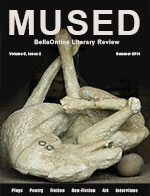Survivor
Rachel Thompson
The muffled boom caused Yukiko and her grandfather, Ojisan, to stop packing the fruit into crates. They stood in the orange grove high on the hill and looked north in the direction of the city where, miles away, smoke could be seen billowing into a mushroom-shaped cloud.
“What is it, Ojisan?” she asked.
“Ah……I don’t know,” he replied.
“Is it coming from Nagasaki?”
“Maybe—your father knew it wasn’t safe there.”
“It looks horrible,” 16-year-old Yukiko cried.
“Be quiet--and stop crying!”
“Where is Obasan? Grandmother was supposed to bring us our lunch!”
The air already smelled different. People working in the nearby rice fields had also stopped to stare at the cloud.
“Let’s go back to the house and turn on the radio,” said Ojisan, shaking his head. “A few days ago there was a bomb dropped on Hiroshima. Now this.”
The Pacific War suddenly seemed very close. Yukiko felt a shiver go up her spine on that warm August day. She and her brothers, along with their mother, Tomo, had been evacuated to her grandparents’ farm in the town of Chijiwa while her father, a doctor, continued his work in the city.
Running into the house with her pony tail bouncing, Yukiko turned on the radio in the tiny living room but all they could hear was noisy static from their local station. Finally she found a news broadcast from Tokyo, over 600 miles to the northeast. The formal voice of the radio announcer confirmed their worst fears.
***
The two-hour ride down the twisting mountain roads the next day was interminable for Yukiko, Tomo, and Ojisan. Arriving in Nagasaki, they could see whole sections of the city lay in ruins and bodies were scattered everywhere. Dazed survivors roamed the streets desperately asking for water. Although the family shared some of what they had, they worried that there would not be enough for Yukiko’s father when they found him.
On the street where the medical clinic had been, bodies were burnt to a crisp, charred beyond recognition. How were they going to recognize the man—their father, husband, and son—if it turned out that he was one of these victims? A gold tooth like his stood out as the sole identifying feature on a blackened body nearby and this was all they needed to convince themselves that their search was over. They loaded the remains onto their truck and began their sad drive back home.
“That’s not my son!” cried Obasan when she saw the body.
“Maybe it is and maybe it isn’t,” said Ojisan. “But we are going to give this one a funeral because that is the respect he deserves. If someone else finds my son’s body, I hope they will do the same.”
Now in mourning, the Okunos followed the Japanese Buddhist rituals of cremation and the ashes were placed in the graveyard plot which also held the cremains of other family members going back generations.
Six days after the bomb was dropped, the family was, again, gathered around the radio at lunch time.
“I can’t understand this formal Japanese! Who’s speaking?” asked Yukiko.
“It’s Hirohito-san, the Emperor,” said Tomo. “It’s the first time we have heard his voice.”
“What’s he saying?”
“Sh! Be quiet!” Ojisan bowed his head and closed his eyes.
“I think he’s telling us the war is over,” said Obasan, with a sigh. “Japan has surrendered.”
***
Being in Nagasaki the day after the bomb, Yukiko was stigmatized as one of the hibakusha (people exposed to radiation). She was told that she would never be able to find a husband or have children. For most of her life she has carried a scar—in the form of a thin line a few inches long— finely drawn horizontally across her neck. This is where surgeons had to operate when her thyroid became severely swollen with goiter, an affliction common among atomic bomb survivors.
Yukiko grew up to be a spirited young woman with a taste for adventure and, four years after the war was over, she left home to work as a nursing assistant at an American hospital at Camp Hakata, Japan. There she met an American army private, Jim Miller, and asked her mother’s permission to marry him.
“He’s the enemy! He killed your father!” cried Tomo.
“Jim didn’t kill him. The bomb did. Now the war is over and Americans aren’t the enemy anymore.”
With Jim, Yukiko had three children and, later, three grandchildren and two great-grandchildren. They made their home in the U.S.A., a country that Japan was at war with when the atomic bombs were dropped and everything changed for her family and the world.
(Author’s note: Yukiko’s father was one of the 40,000 people in Nagasaki who died as a direct result of the atomic bomb. Tomo Okuno died in Japan in 1984 at the age of 89. Yukiko--who goes by the name of Jeannie Miller--is now 85 years old and lives in Fayetteville, N.C. She is a widow, as are many of her Japanese friends in the U.S. who also married American servicemen after World War II. Yukiko’s oldest son, James, is my husband.)

